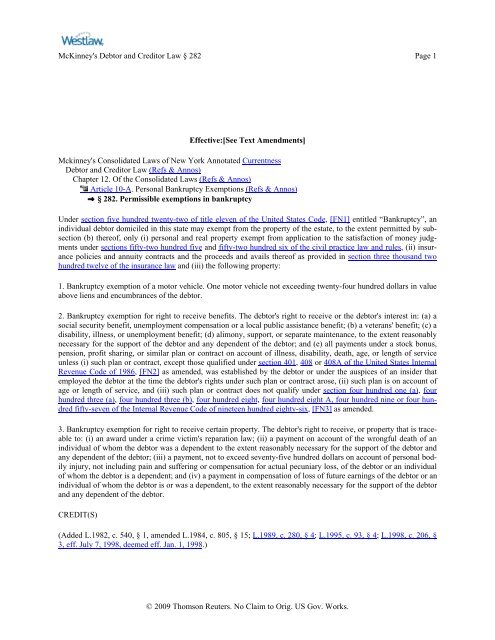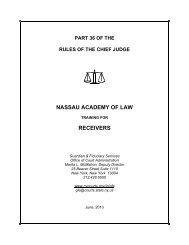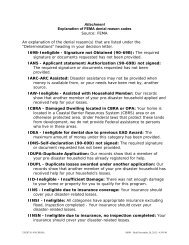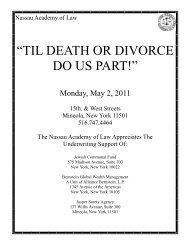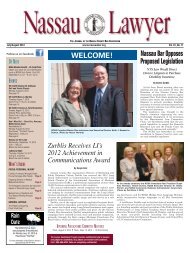FRAUDULENT CONVEYANCES Nassau Academy of Law CLE Live ...
FRAUDULENT CONVEYANCES Nassau Academy of Law CLE Live ...
FRAUDULENT CONVEYANCES Nassau Academy of Law CLE Live ...
Create successful ePaper yourself
Turn your PDF publications into a flip-book with our unique Google optimized e-Paper software.
McKinney's Debtor and Creditor <strong>Law</strong> § 282 Page 1Effective:[See Text Amendments]Mckinney's Consolidated <strong>Law</strong>s <strong>of</strong> New York Annotated CurrentnessDebtor and Creditor <strong>Law</strong> (Refs & Annos)Chapter 12. Of the Consolidated <strong>Law</strong>s (Refs & Annos)Article 10-A. Personal Bankruptcy Exemptions (Refs & Annos)§ 282. Permissible exemptions in bankruptcyUnder section five hundred twenty-two <strong>of</strong> title eleven <strong>of</strong> the United States Code, [FN1] entitled “Bankruptcy”, anindividual debtor domiciled in this state may exempt from the property <strong>of</strong> the estate, to the extent permitted by subsection(b) there<strong>of</strong>, only (i) personal and real property exempt from application to the satisfaction <strong>of</strong> money judgmentsunder sections fifty-two hundred five and fifty-two hundred six <strong>of</strong> the civil practice law and rules, (ii) insurancepolicies and annuity contracts and the proceeds and avails there<strong>of</strong> as provided in section three thousand twohundred twelve <strong>of</strong> the insurance law and (iii) the following property:1. Bankruptcy exemption <strong>of</strong> a motor vehicle. One motor vehicle not exceeding twenty-four hundred dollars in valueabove liens and encumbrances <strong>of</strong> the debtor.2. Bankruptcy exemption for right to receive benefits. The debtor's right to receive or the debtor's interest in: (a) asocial security benefit, unemployment compensation or a local public assistance benefit; (b) a veterans' benefit; (c) adisability, illness, or unemployment benefit; (d) alimony, support, or separate maintenance, to the extent reasonablynecessary for the support <strong>of</strong> the debtor and any dependent <strong>of</strong> the debtor; and (e) all payments under a stock bonus,pension, pr<strong>of</strong>it sharing, or similar plan or contract on account <strong>of</strong> illness, disability, death, age, or length <strong>of</strong> serviceunless (i) such plan or contract, except those qualified under section 401, 408 or 408A <strong>of</strong> the United States InternalRevenue Code <strong>of</strong> 1986, [FN2] as amended, was established by the debtor or under the auspices <strong>of</strong> an insider thatemployed the debtor at the time the debtor's rights under such plan or contract arose, (ii) such plan is on account <strong>of</strong>age or length <strong>of</strong> service, and (iii) such plan or contract does not qualify under section four hundred one (a), fourhundred three (a), four hundred three (b), four hundred eight, four hundred eight A, four hundred nine or four hundredfifty-seven <strong>of</strong> the Internal Revenue Code <strong>of</strong> nineteen hundred eighty-six, [FN3] as amended.3. Bankruptcy exemption for right to receive certain property. The debtor's right to receive, or property that is traceableto: (i) an award under a crime victim's reparation law; (ii) a payment on account <strong>of</strong> the wrongful death <strong>of</strong> anindividual <strong>of</strong> whom the debtor was a dependent to the extent reasonably necessary for the support <strong>of</strong> the debtor andany dependent <strong>of</strong> the debtor; (iii) a payment, not to exceed seventy-five hundred dollars on account <strong>of</strong> personal bodilyinjury, not including pain and suffering or compensation for actual pecuniary loss, <strong>of</strong> the debtor or an individual<strong>of</strong> whom the debtor is a dependent; and (iv) a payment in compensation <strong>of</strong> loss <strong>of</strong> future earnings <strong>of</strong> the debtor or anindividual <strong>of</strong> whom the debtor is or was a dependent, to the extent reasonably necessary for the support <strong>of</strong> the debtorand any dependent <strong>of</strong> the debtor.CREDIT(S)(Added L.1982, c. 540, § 1, amended L.1984, c. 805, § 15; L.1989, c. 280, § 4; L.1995, c. 93, § 4; L.1998, c. 206, §3, eff. July 7, 1998, deemed eff. Jan. 1, 1998.)© 2009 Thomson Reuters. No Claim to Orig. US Gov. Works.


